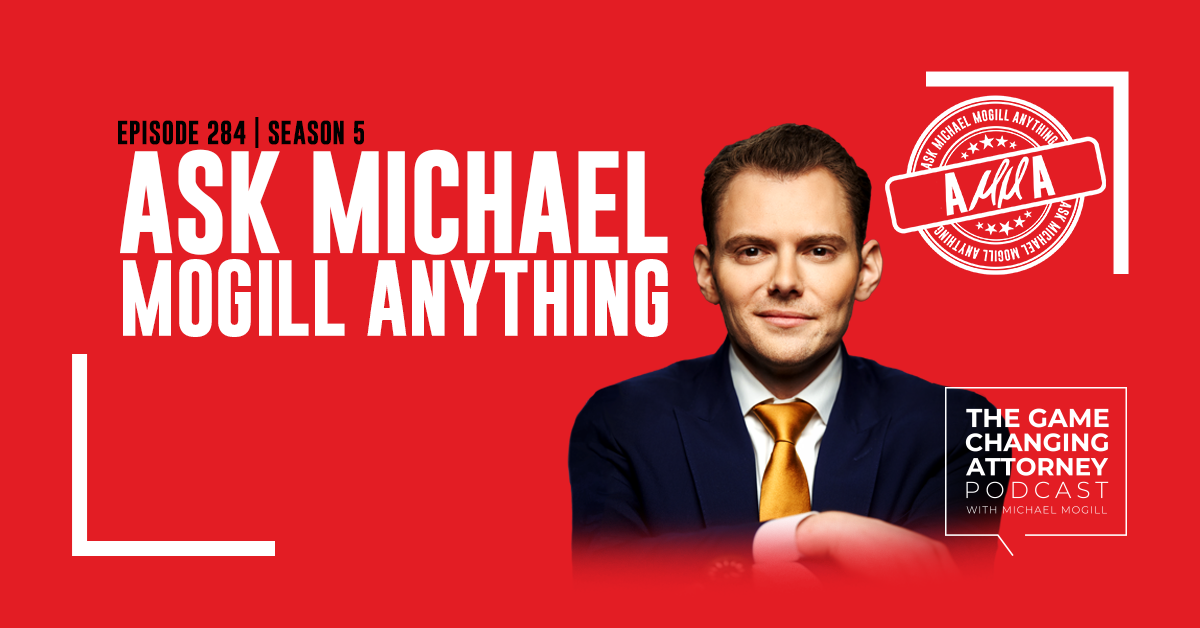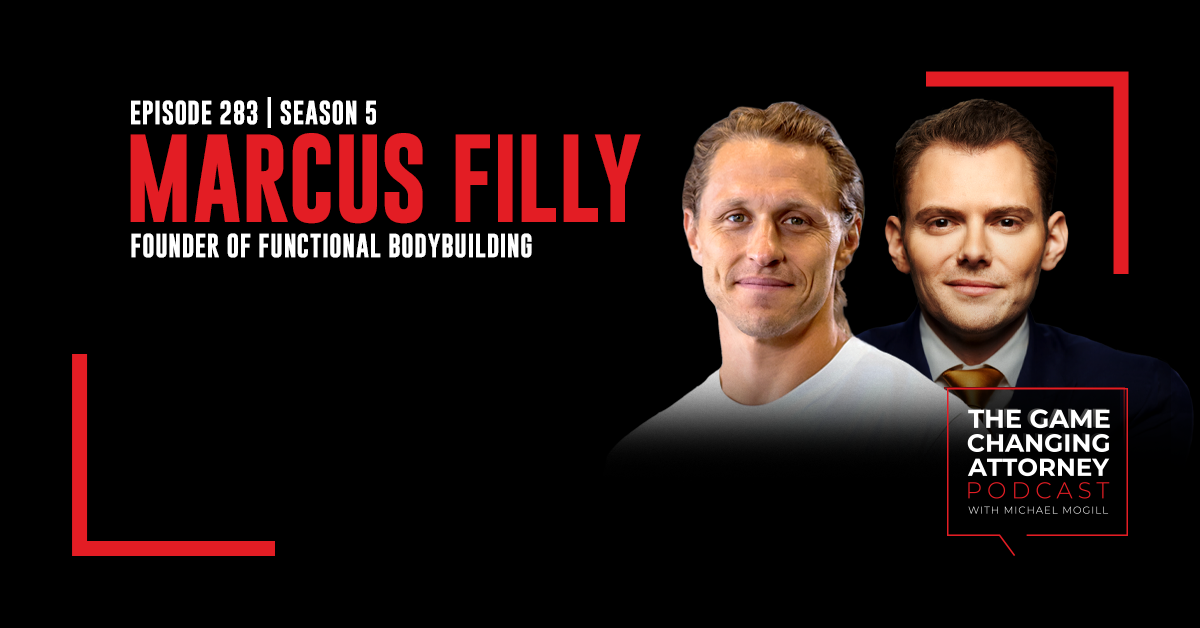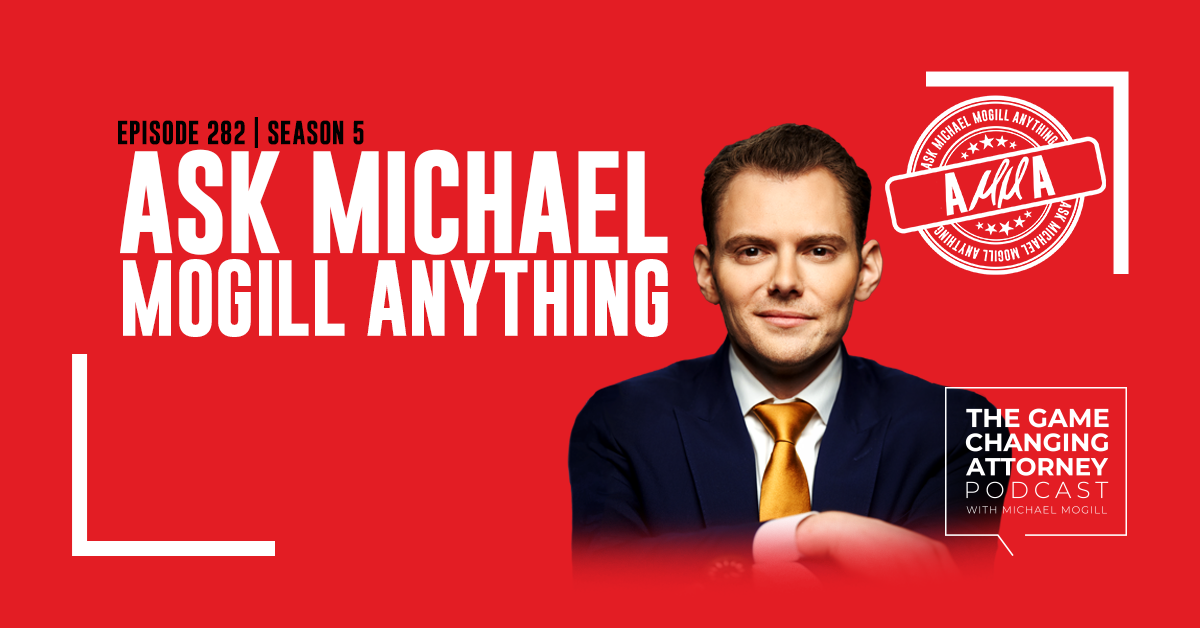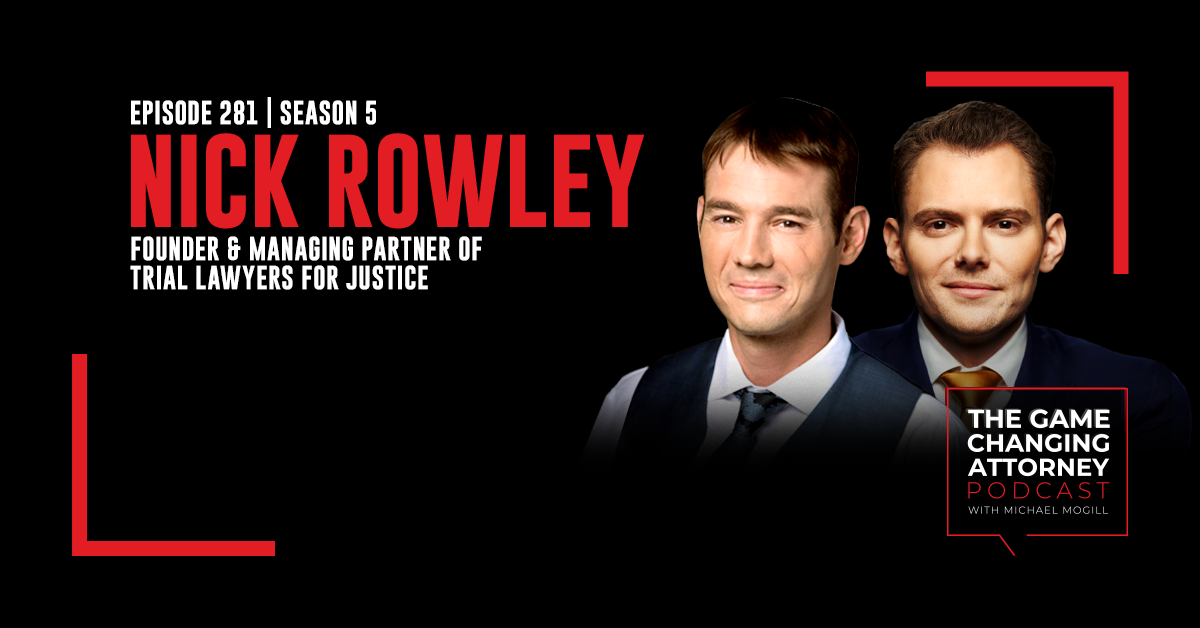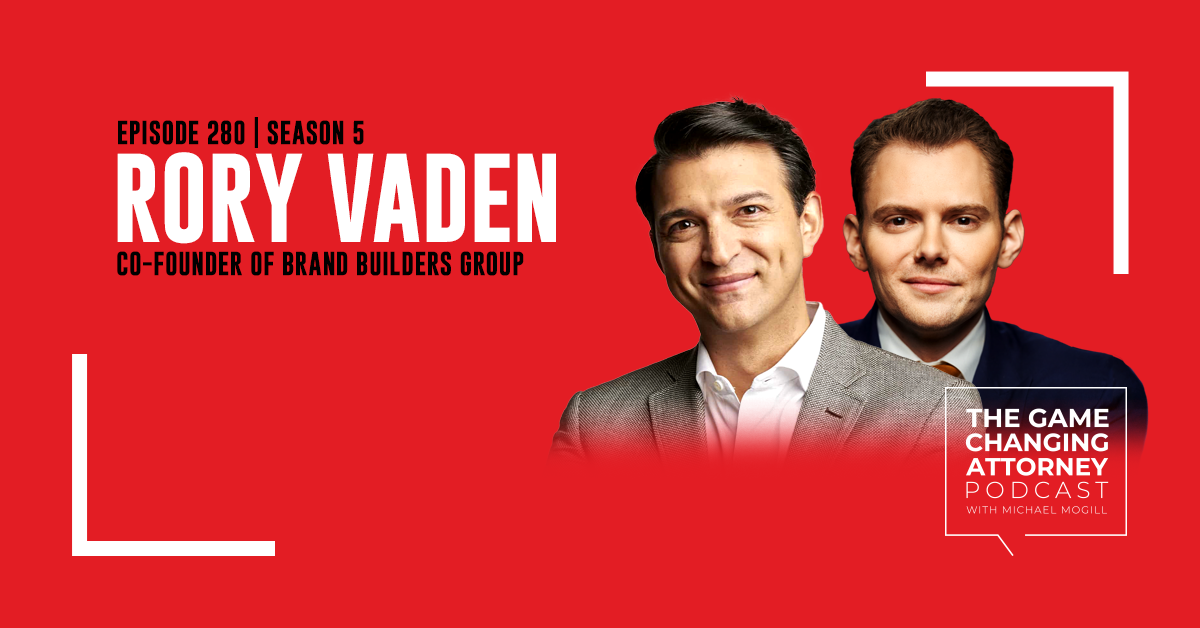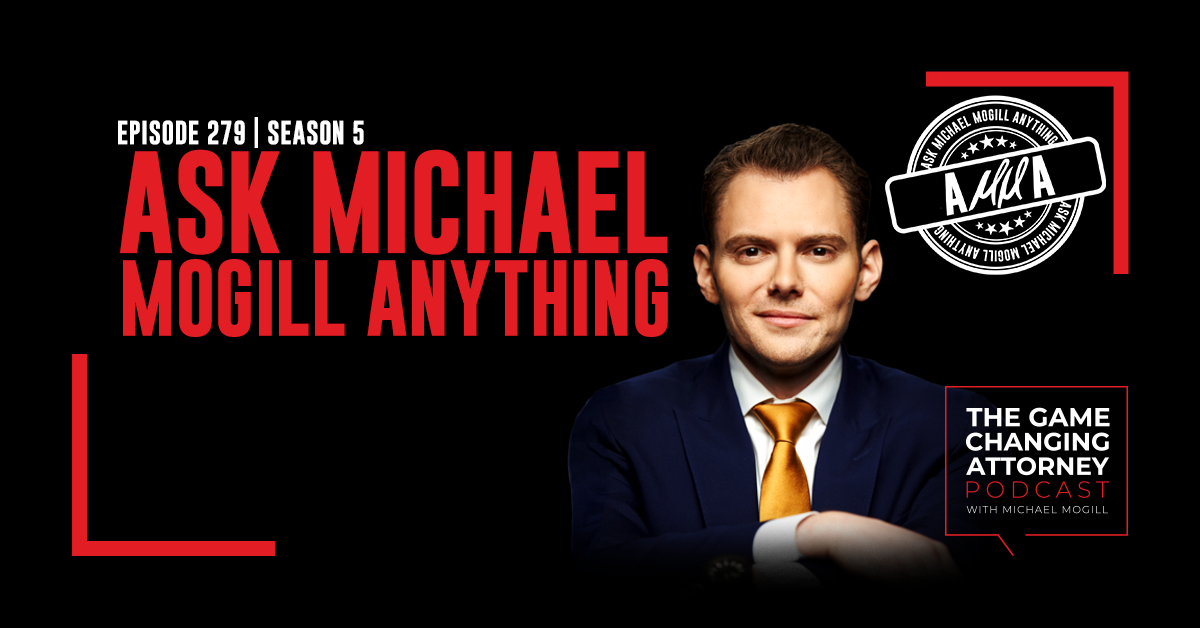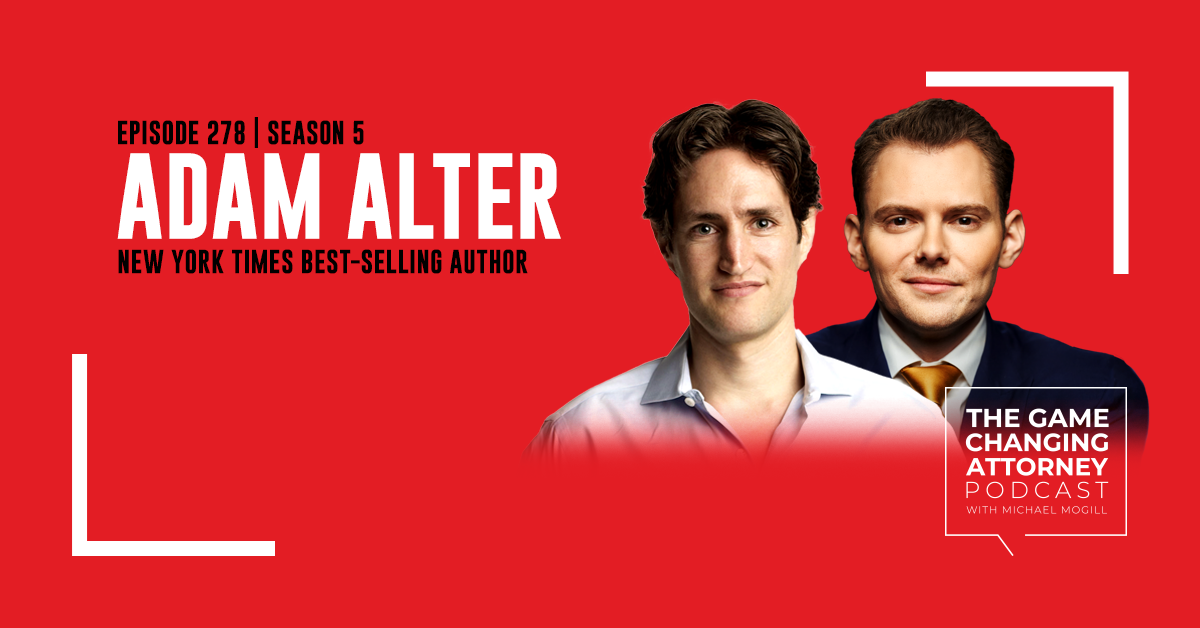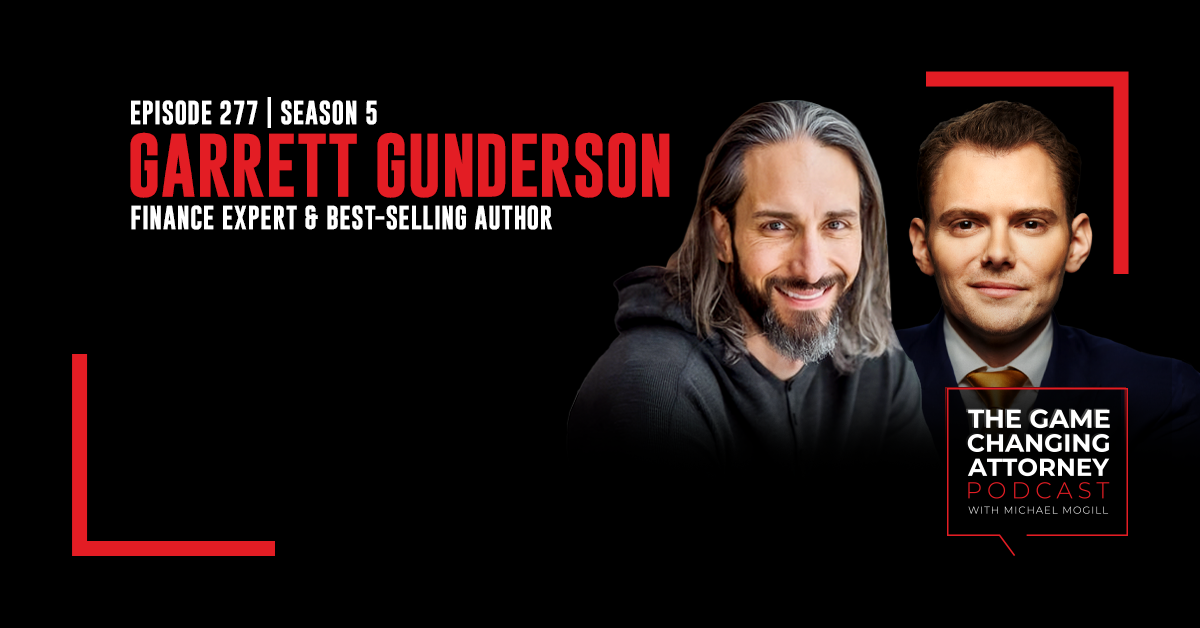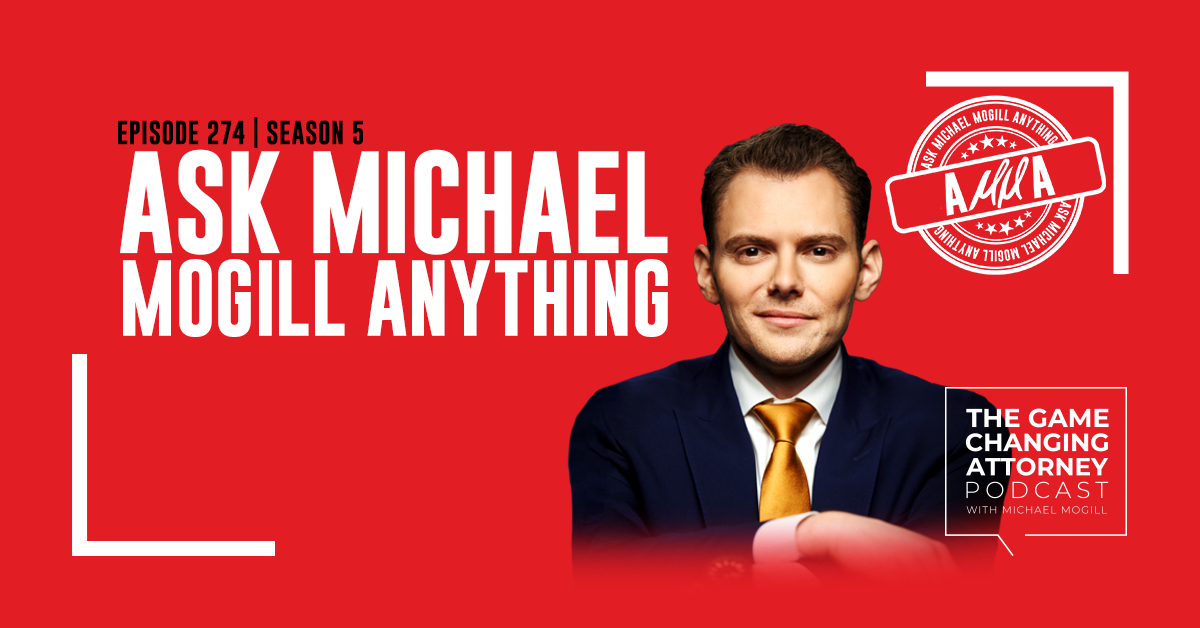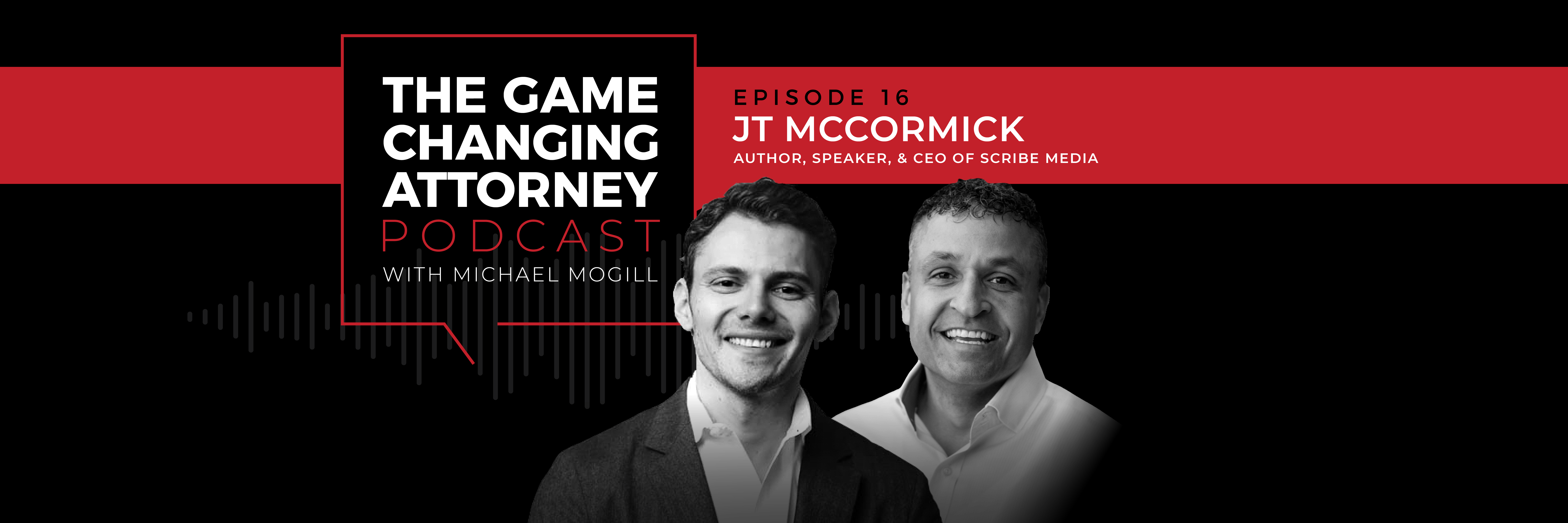
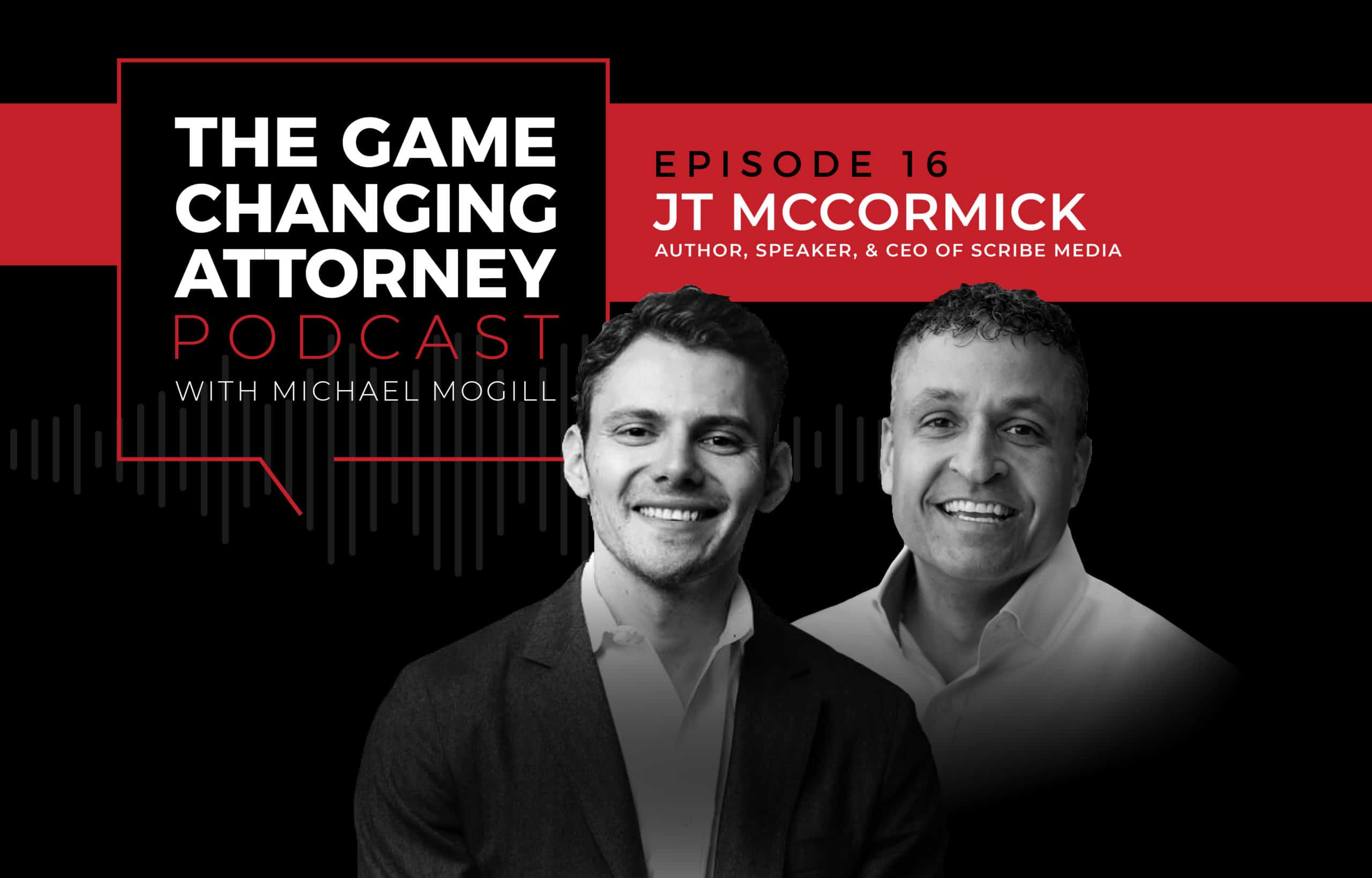
EPISODE 16 — JT McCormick — The Power of Perspective
As leaders, we all face a level of adversity as we strive for our goals. However, with a little perspective, that adversity won’t hold us back — it will drive us forward.
JT McCormick, CEO of Scribe Media, has a unique perspective on adversity. Despite the unimaginably challenging circumstances in which he grew up, JT has established himself in the entrepreneurial world and become an inspirational leader to many.
In this episode of The Game Changing Attorney Podcast, JT shares his unbelievable story — and the triumphs and setbacks he experienced along the way. He explains how he leverages adversity for growth, works through personal and professional challenges, and how you can use dark moments to become the person you’re meant to be.
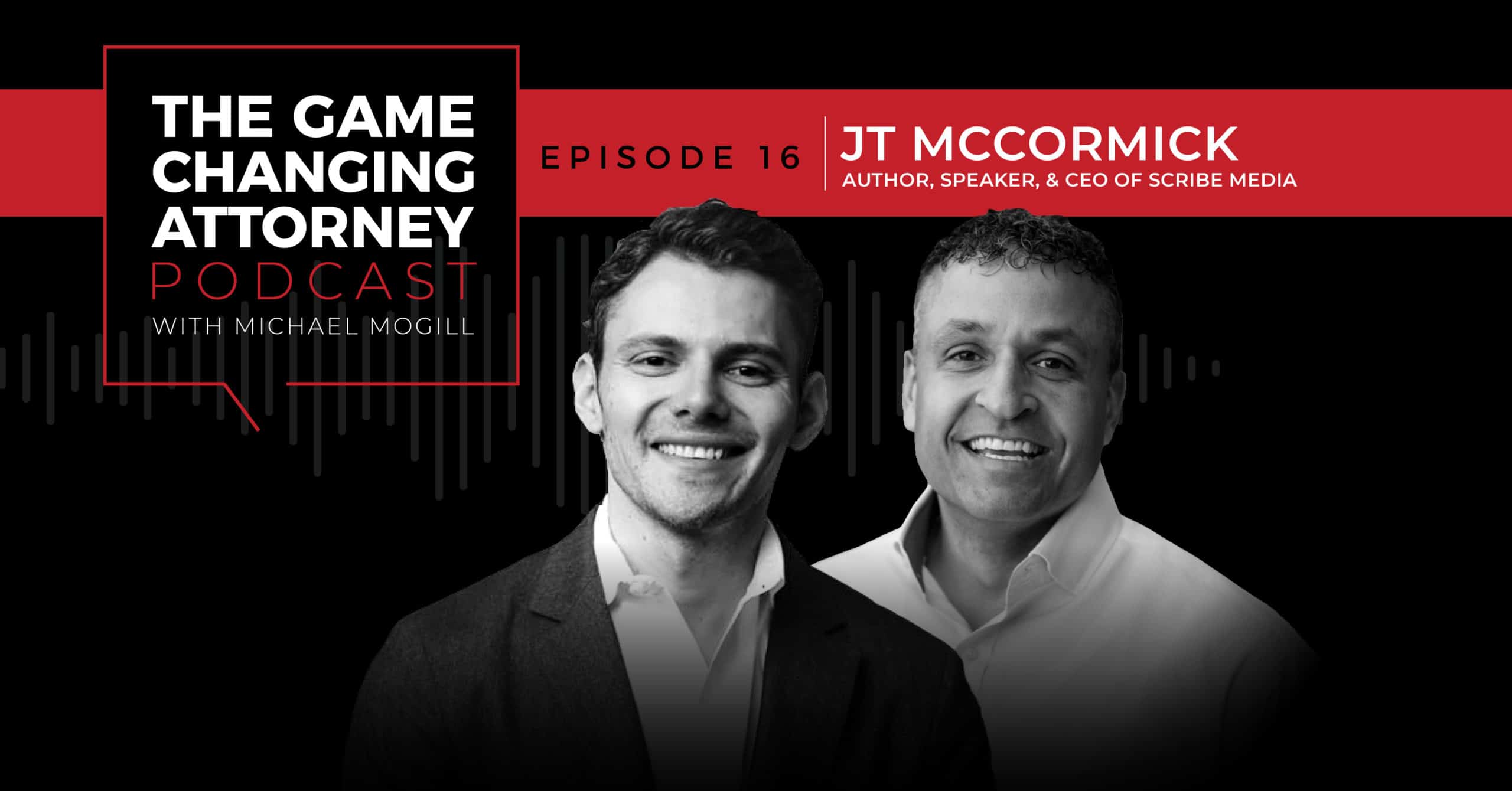
Listen & Subscribe
Show Notes:
3:35 – On coming from a tough background. “My dad was a black pimp and drug dealer. He fathered 23 children. I’m one of 23. And then my mother is white, so I’m mixed race: half black, half white. My mother was raised in an orphanage until she was 17 years old. When she graduated high school, they gave her a small suitcase, 20 bucks, and they said, ‘Good luck to you. There’s the world.’ And unfortunately for my mother, one of the first people she met was my well-dressed, fast-talking, pimp father. And so the only reason to this day that I was born is because my mother had an abortion the first time she got pregnant. The abortion was illegal, and it was so bad that the second time she got pregnant with me, she took her chances of raising the child. So that’s what I came into the world to. You know, my mother and I grew up on welfare, poor. When I say poor — you’ve heard me make the joke, you know, that we couldn’t afford the ‘O’ and the ‘R.’ We were just ‘Po.’ You know, free lunch. I know all too well what it’s like to eat out of the trash can to have something to eat. I know all too well what it’s like to eat lunch Friday afternoon at school, go to bed Friday evening, and you don’t eat again until Monday afternoon when you get your free lunch again.”
5:11 – Developing perfectionism due to abuse. “And I remember saying to myself, ‘Okay, I am never going to be in a position where I don’t know what to do.’ Now the downside of that is there’s no such thing as perfect, but I was always in pursuit of being perfect because I’d never wanted to find myself in a position of not knowing what to do. So for me, I look at a situation like that where most people will sit back, crawl under the covers, and get depressed, but I can’t change the past. I take the story, and I make the most of it and figure out how I can find the positives and go from there.”
5:59 – Show them what you can become. Don’t tell them. “You know survival, man. I believed there was something more, and I’ll say this. You know, we live in a society where everyone’s always telling you what to do, telling you what you can become. Sometimes it’s not what you tell someone. It’s what you show them.”
6:29 – Realizing life was full of possibilities was game changing. “It was the first time, at 10 years old, I saw $10 million, $15 million, $25 million homes. And these homes — one family lived in these homes, and they were bigger than the projects that I grew up in. It showed me the possibility. And that became one of those game changing moments where I said, ‘Wow, I want one of those. I’m going to have one of those.’ And it became my mission of, ‘Okay, I saw it. Now I want to go achieve it.’ So I just always believed that there could be something different. I believed I could do something more in life, and I just kept pushing. It was survival. Don’t give up. Don’t ever give up. Keep asking questions. Outwork everyone.”
8:09 – You have to love yourself first and foremost. “First you have to love yourself, even at the end of the day if no one else loves you. If no one else cares about you, love yourself. Care about yourself. If you can do those two things, then you can say, ‘Okay, I have someone that believes in me. Me.’”
9:03 – You can control your work ethic. “The last time I was leaving juvenile, one of the corrections officers pulled me aside — big dude, big, black dude. And he says, ‘Come here, son.’ He gets down on one knee, and he points at me in my face. He says, ‘If you ever come back here again, you’re going to man prison.’ I’m 48 years old, man. I don’t know what it is about the sound of man prison, but I don’t know what goes on in man prison. So that was a pivotal key moment for me because I didn’t want to go to prison. So from that point on, after my third time in juvenile, I said, ‘Okay, I’m not going to man prison.’ So then it gave me a different shift of, ‘Okay, how do I avoid going to man prison?’ And so academically, I’m not the smartest or brightest person in the world, but I found that I can outwork you. I can control my work ethic.”
14:35 – Do the work, no matter what it is. “I’ve never been afraid to put in the hours put in the work or to do whatever someone else isn’t willing to do. I’ll do it. You might say, ‘Take out the trash.’ Then I’m going to ask you where the trash bags are. I’m not going to sit there and say, ‘That’s not my role. I don’t get paid for that. It’s not my job.’ I will do whatever I need to do to be successful. So that’s really been the mantra of my career.”
18:26 – It truly takes a team to succeed. “And I said to him, ‘No one person builds a great company. I don’t care whose name is on the door. No one person builds a great company. It takes a crew of talented individuals to build a great company.’”
21:00 – Success does not come without sacrifice. “Some of the greatest successes come from the hardest decisions that you make in life, and sometimes you’ve got to move — you have to do the hard things in life. You know, I’ve sacrificed a lot of time. I don’t believe you have to suffer to be successful, but I damn sure do believe you have to sacrifice to be successful. Be it time with your family, be it personal things that you may like, you are going to make some sacrifices if you want to be successful.”
22:52 – Put your own problems into perspective. “Unfortunately, we get so caught in our own bubbles. We get so caught up in, ‘Oh my God, me, me, me’ and ‘the day is hard.’ I run this thing for myself personally: I call it the one-mile radius rule. Go stand outside your house or go stand outside your office, and within a one-mile radius, somebody will change places with you. And so that’s really how I look at pushing myself through what’s hard, what’s going on. It’s not dipping back into the stories of how I grew up. I just look at what’s going on in the world right now. You know, the person who can’t afford to pay the rent this month, the person who can’t pay their mortgage, the person who can’t get through the unemployment website to get a check and they’re sitting there like, ‘Oh my God. How am I going to feed my two kids? I got laid off. I’ve got two kids. I’m a single parent, and I can’t get unemployment. What am I going to do?’ Think about that for a second, and then look over and think about whatever problem you may be facing. It kind of puts it in perspective.”
25:37 – Privilege isn’t always about race. “You see so many people talk about privilege, and then it’s termed race — you know, white privilege. Me, I am half white, half black. I don’t look at it from a race angle. I look at it as, ‘Okay, what am I privileged to have? Okay, I am mentally well. All my arms and legs work great. That’s a privilege. I was born here in this country. Oh, that’s a privilege.’ So I don’t look at race as who’s privileged and who’s not. I look at is as I’m at the game. Period. Maybe the game is harder for me. Maybe I’m starting from a different seat. I don’t care. As long as I’m here. I was born in the states. I am at the game. That’s all I needed. Everything else I’ll figure it out, and I’ll make it happen.”
30:56 – Live by your own principles and values. “It’s a tribe. It’s a group effort. There’s never one person. But if your principle and values are what they are, you have to live by those. You’ve heard so many people that have said this, but it can’t just be some shit you have on the wall. You have to keep them top of mind. You have to treat people respectfully. You know this about me: you will never ever hear me say, ‘my team.’ Eliminate the words ‘I’ in your vocabulary unless you’re taking responsibility for a mistake. That’s it. But when we’re talking about success, it’s a team effort. My three rules of leadership are surround the company with people far smarter than yourself, surround yourself with people far smarter than yourself, and then rule number three — repeat rules one and two.”
33:14 – Don’t let your ego get in the way of improvement. “Some people can’t get out of the way. They feel the need to be the smartest person in the room. At the moment you feel that you need to be the smartest person in the room, your company will never scale. You are going to be a broken company as long as you’re in business. So you’ve got a lot of ego that goes into it, and a lot of arrogance and a lot of fear, a lot of imposter syndrome — which goes back to what we talked about. People feel like, ‘Well, wait a minute. If I bring in people who are smarter than me, they’re going to realize I don’t know the answers.’ Good! Let’s identify that you don’t know the answer so we can figure out how we grow, how we continue to get better and improve.”
37:07 – Learn fast and grow. “I do my best to not have any regrets because even in those remorseful situations, I learned how to become better. I learned, ‘Oh, that wasn’t good. Don’t do that.’ And I’ll share this last piece with you. I truly in my heart believe you only fail if you stop trying. So I don’t do fail fast — I mean, hell, my whole life I’ve been trying to learn faster — so the phrase ‘fail fast’ I think is complete bullshit. The goal is to learn faster. So for me, I believe you only fail if you stop trying. So I’ve got a lot of failed relationships because we broke up. We’re not together anymore. But as far as business — and when you think of me as a first-time president of a software company — oh my God, the mistakes I’ve made. But the goal is to learn, grow, and not repeat those mistakes.”
EPISODE RESOURCES
401k investing
Robert Johnson
Connect with Michael
- Text directly at 404-531-7691
